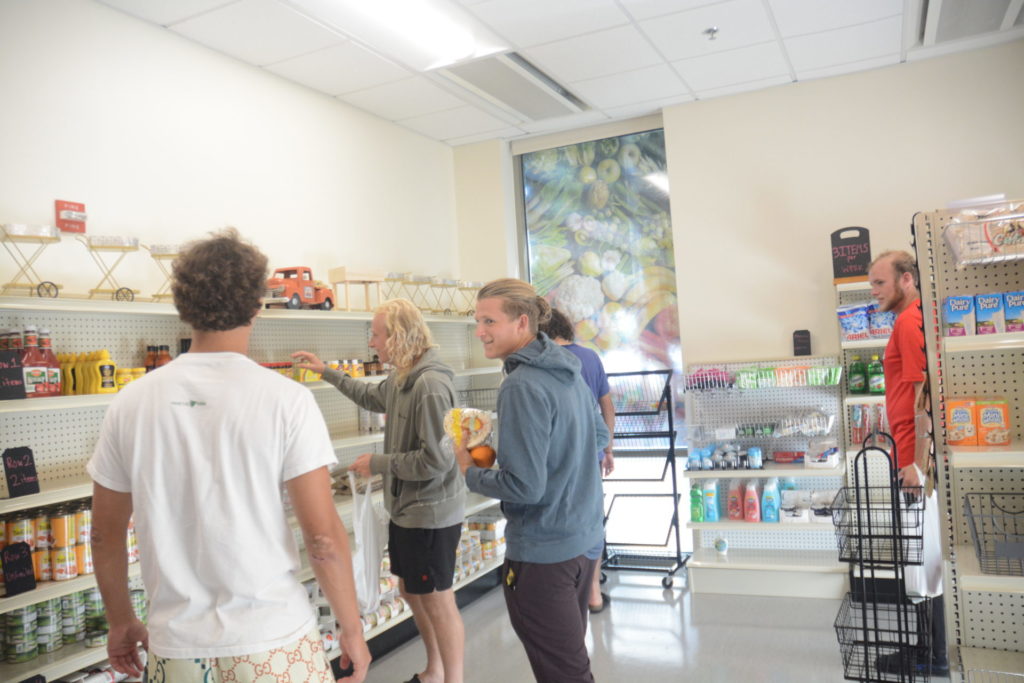The Las Positas mini-market, which opened on Oct. 3, provides free food, hygiene and cleaning supplies for all students and faculty on a daily basis. It’s located in the student life office at the front of the 1600 building, with the word “welcome” plastered across the window. It’s open from 9 a.m. to 5 p.m., Monday through Thursday.
The mini market sets out to help any and all students, regardless of how much ‘they need it.’ Josue Hernandez, the Program Coordinator of Student Life and Leadership, says if you can save five, ten, or fifteen dollars a week by using the market, it’s a cost-saving resource.
Upon entering the student life office, students are greeted by a comfy environment complete with couches, candy jars, a mounted tv-screen where students can play an office-provided Nintendo switch and study spaces. Inside the office, to the left, is the new mini-market.
To use the market, all students need to do is sign in with their W identification number at the computer desk next to the entrance.
The mini-market is funded by the 2020 California Community Colleges legislation, AB132, which requires schools to bill some kind of basic needs and to employ a basic needs coordinator.
AB132 is a one-time fund worth $200,000. The mini-market must use all these funds within the year, but it can roll over. These funds were budgeted toward building the mini-market and restocking supplies.
Most of the mini-market’s supplies come from the Alameda County Food Bank, which also supplies Las Positas’ monthly program, The Market. The Market gives out food and other supplies to the local community, not just students.
Since the food bank only gives out supplies monthly, the student life office must restock the mini-market to meet student demand. Shawn Taylor, Jeanne Wilson and Josue Hernandez utilize stores like Costco Business and Dollar Tree daily for supplies.
Director of Student Equity and Success, Shawn Taylor, says, “we don’t want to compete with the cafeteria and the bookstore, but we want to make sure people get what they need. We want to make sure they take foods you have to cook and instant food to try to be balanced.”
According to Hernandez, while Las Positas had a pantry before, “students didn’t want to come or they didn’t feel like they could grab things.”
In an attempt to resolve this issue, the pantry was renamed the mini-market to remove any stigma for students who may need supplies.
“I didn’t want to use the traditional shelving. I wanted students to have the experience. I want them to feel like they’re shopping…the stigma that ‘I’m feeling bad taking something’–that’s something we wanted to take out.”
Other community colleges have pantries for students, but nothing quite at the level of Las Positas. When an accreditation team, a group that ensures an institution maintains educational standards, visited the mini-market, they wanted to steal the idea.
In the first week, Hernandez says he heard stories from students saying that their experiences at the mini-market were the first time they felt welcomed at Las Positas. He has also heard appraisals from staff about what a great resource it is for students.
“Usually when students come and say, ‘I just wanna look,’ I tell them, ‘I will guarantee you that you will take one thing.’ And then they do,” Hernandez said.
Gabriella Sanchez, a student at LPC, has been using the market since opening. “I needed some hygiene and feminine products…It saved me some money,” Sanchez said.
Taylor said one student’s mother sent a four-page email thanking the mini-market for giving them food, toiletries and cleaning supplies. “‘I can’t believe they did that at a school,’” Taylor recalled from the email.
“The common things students have taken have been the basic things. That includes deodorant, toothbrushes, toothpaste and toilet paper,” Hernandez said.
Projects like the mini-market can take several months to a year to finish because of how long the authorization process can take.
Hernandez said his goal was to complete the mini-market in one month.
His main argument for the swiftness he demanded was the urgent need for student resources, but there was no recorded data to support it. Now, with the market’s log record showing that almost 100 students use the mini-market daily, Hernandez can prove it.
“It makes you feel like you accomplished something. The reaction is priceless. This is why I did this, this is why I care so much and this is why I was so passionate in doing it,” Hernandez said.
Hernandez understood that a resource like the mini-market is super important to students because of his experience in foster care. He had to cook on a budget and felt shameful asking for food.
“For me to convert that into a positive, and to say this center is for those of me that were once hungry, but it’s open for those who should not be fearful of grabbing anything that they want, that’s the bottom line,” Hernandez said.
In the future, the student life office plans to add more compost bins and outdoor areas on campus, contribute more produce items to the mini-market and integrate a career closet. The closet, set to open in January, will allow students to check out formal clothing for internships or job interviews, among other services.
Furthermore, a basic needs coordinator will be hired in November to manage the needs of the mini-market.
“This is open for every student and when I say every student, we’re not looking at your income, this is for you. For the state to tell and to recognize this is a basic need across California, that speaks volumes, it’s a right to have,” Hernandez said.
Lizzy Rager is the managing editor for The Express. Follow her @ragerwriter.


